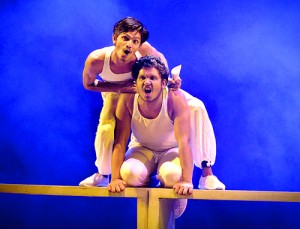The death of walking
View(s):Friedrich Nietzsche, in an essay titled ‘On Truth and Lie in an Extra-Moral Sense,’ reflects on the question ‘What then, is truth?’ He argues that what we call truth is an illusion created by language; this illusion has become obligatory after prolonged unquestioned use; to quote Nietzsche, truth is: ‘…coins which have lost their pictures and now matter only as metal, no longer as coins.’
Nietzsche’s framework of ‘truth’ as an illusion is an interesting scaffolding to negotiate the thematic significance of the play Walking Path, where language (‘illusion’) was abandoned in favour of gestures, movements, signs and ‘pure’ sounds (laughter, lamentation) to explore the ‘new walking path culture of Sri Lanka.’ The actors – or the walkers – neutralized their individual identities by sporting white costumes. The props were simple. The vacuum created by silence was filled by music, which at times was haunting with a twangy guitar hook, and, at times as quiet as silence itself. The common thread that tied everything together on stage was the act of ‘walking’ – at times mechanical, at times restless and at times listless. Thus, the audience was deprived of thoughts stimulated by external input, etherised upon their seats and was forced to confront their own inner thoughts. (Could those thoughts be measured with teaspoons?)
Since the play is a representation of the culture of walking let me ask with Niestzsche-an twist: ‘What then, is the issue with the walk?’
The world of the walker or walking that the play unfolded, I argue, is a politicized space: within the play, walking was no longer an act of…well…walking; other discourses – both social and individual – have disrupted the act of walking and etched themselves into it. Whether this has enhanced or decayed the meaning of walking is a judgment best left to the individual members of the audience. But, it was obvious that walking was in a serious conflict with other discourses.
The most obvious discourse that dominated walking was the one powered by electromagnetic waves: mobile phone, ipod and the laptop. It was obvious from the play that these devices have driven the walkers away from their social worlds into isolated spheres within themselves. The outcome was a meaningless — and even comical – series of absurd gestures, with possible reminders of Gus’s terrible (and prophetic) lamentation in Pinter’s The Dumb Waiter: ’We’ve got nothing left! nothing! Do you understand?’

Pic by Prauda Buwaneka
Sensuality and relationships too have entered the realm of walking (we walk into relationships, they say!). Walkers explore physical relationships in the midst of walking in public spaces – and no public space is an empty space! There are other discourses which occupy public spaces and the bold outdoor expression of love is contested by other possessors of space. Obsession with order and resisting of instincts seem to be the dominating discourse in those public spheres, and the walkers have the added burden of either resisting or negotiating these discourses. The voyeurism of non-walking-bystanders adds further stress to the walkers. Shrewd acts of unlawful gaze convert the walkers and lovers into live movies.
The play problematised walking and forced the audience to reflect on this simple act. And it raised more questions than answers, about the act of walking: How do we still walk the walk amidst all these disruptions? Do we actually walk when we walk?
Or perhaps, the play attempts to reveal a deeper ‘truth’ (or an illusion?): that the ideal mode of carefree joyful walk, which was once featured in a television advertisement, possibly as a common motif for walking, is no longer a reality or has never been a reality. We have been deluded. We have never walked at all. Perhaps, Gus was right: we’ve got nothing left, other than an illogical meaningless sequence of illusions.
| Walking Paths, a play without words
- Reviewed by Lal Medawattegedara |


